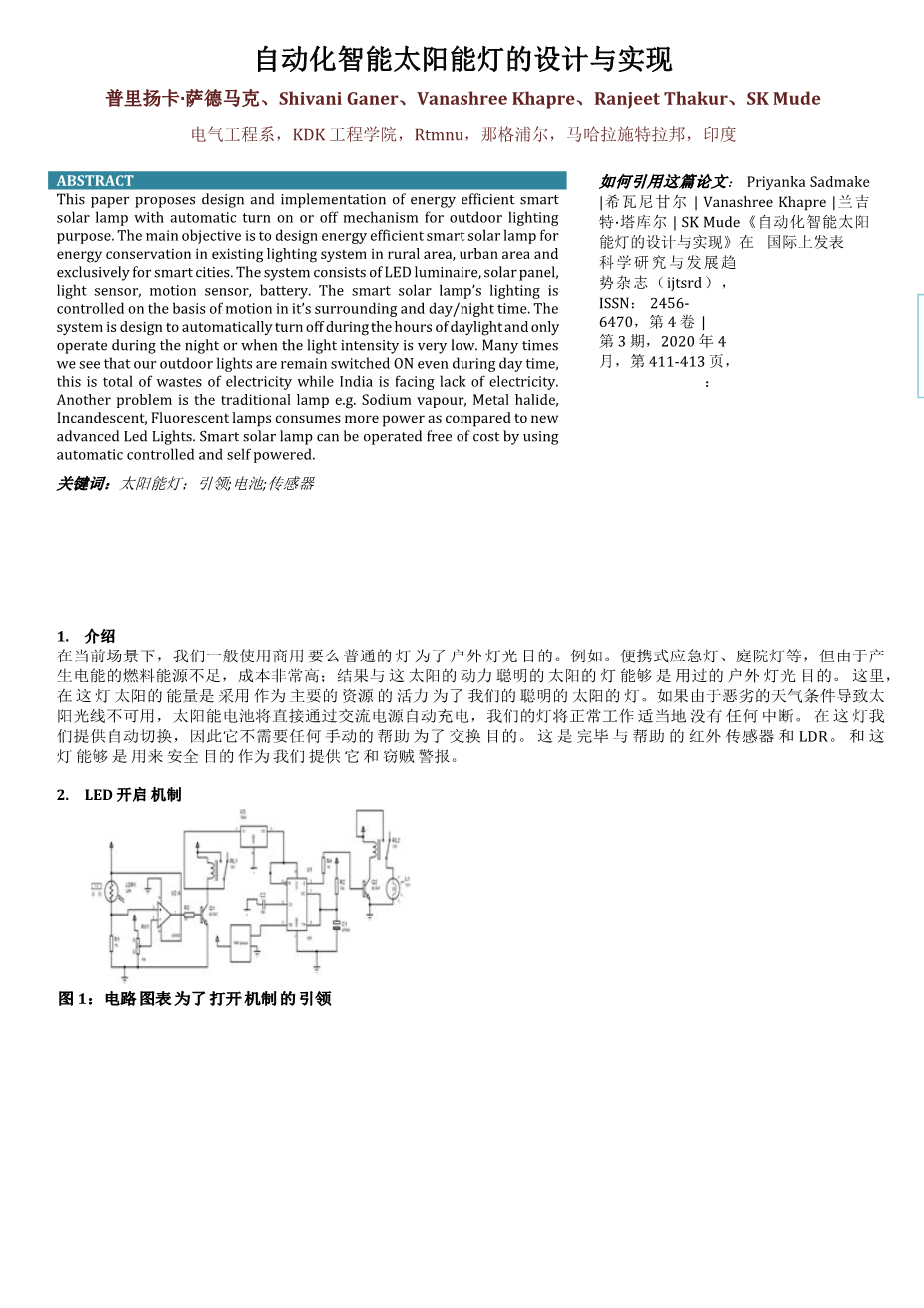International Journal of Trend in Scientific Research and Development (IJTSRD)
Volume 4 Issue 3, April 2020 Available Online: www.ijtsrd.com e-ISSN: 2456 – 6470
Design and Implementation of Smart Solar Lamp with Automation
Priyanka Sadmake, Shivani Ganer, Vanashree Khapre, Ranjeet Thakur, S. K. Mude
Department of Electrical Engineering, KDK College of Engineering, Rtmnu, Nagpur, Maharashtra, India
How to cite this paper: Priyanka Sadmake | Shivani Ganer | Vanashree Khapre | Ranjeet Thakur | S. K. Mude 'Design and Implementation of Smart Solar Lamp with Automation' Published in International
IJTSRD30481
This paper proposes design and implementation of energy efficient smart solar lamp with automatic turn on or off mechanism for outdoor lighting purpose. The main objective is to design energy efficient smart solar lamp for energy conservation in existing lighting system in rural area, urban area and exclusively for smart cities. The system consists of LED luminaire, solar panel, light sensor, motion sensor, battery. The smart solar lamprsquo;s lighting is controlled on the basis of motion in itrsquo;s surrounding and day/night time. The system is design to automatically turn off during the hours of daylight and only operate during the night or when the light intensity is very low. Many times we see that our outdoor lights are remain switched ON even during day time, this is total of wastes of electricity while India is facing lack of electricity. Another problem is the traditional lamp e.g. Sodium vapour, Metal halide, Incandescent, Fluorescent lamps consumes more power as compared to new advanced Led Lights. Smart solar lamp can be operated free of cost by using automatic controlled and self powered.
ABSTRACT
Journal of Trend in Scientific Research and Development (ijtsrd), ISSN: 2456-
6470, Volume-4 |
Issue-3, April 2020, pp.411-413, URL:
www.ijtsrd.com/papers/ijtsrd30481.pdf
KEYWORDS: Solar Lamp; LED; Battery; Sensors
INTRODUCTION
In the current scenario, we are generally using commercial or normal lamp for outdoor lighting purpose. For ex. The portable emergency lamp, garden lamp, etc. but due to the shortage of fuel energy for the generation of electrical energy, it is very costlier; in consequence with this solar powered smart solar lamp can be used for outdoor lighting purpose. Here, in this lamp solar energy is use as main source of energy for our smart solar lamp. And in case of unavailability of sun ray due to bad weather conditions the solar battery will automatically charge through ac mains directly and our light will functions properly without any interruption. In this lamp we provide automatic switching thus it does not require any manual help for switching purpose. This is done with the help of PIR sensor and LDR. And this lamp can be use for security purpose as we provide it with burglar alarm.
LED TURN ON MECHANISM
Fig-1:Circuit Diagram for Turn-On Mechanism of LED
Copyright copy; 2020 by author(s) and International Journal of Trend in Scientific Research and Development Journal. This is an Open Access article distributed under the terms of
the Creative
Commons Attribution
License (CC BY 4.0) (http://creativecommons.org/licenses/by
/4.0)
The above circuit diagram is mounted on PCB. In above diagram, LM 358 IC is used as a comparator. The LDR is connected in series with resistance R1. The LDR and R1 used as voltage divider. When the light intensity decreases, the voltage drop across LDR also decreases. The non- inverting pin of Op-Amp is connected to LDR. The inverting pin of OpAmp is connected to potentiometer. The potentiometer is used to set the voltage of comparator. When the intensity of light decreases, the output of the Op- Amp is set to high and accordingly the relay is set on and connect the next stage for performance. The next stage is performance of human sensor detection system. In this system, PIR sensor is used to detect the human presence, if the human presence is detected, then at that time the mono-stable multivibrator will set the relay ON for some time. When the human being is present then at that time the LED light will turn ON, and when there is no human in the area then light will automatically turn OFF. Relay is driven through transistor BC547, the relay is used for connecting LED lamp on battery.
BLOCK DIAGRAM AND ITS EXPLANATION
Fig-2:Block Diagram of Solar Lamp
The working principle of this smart solar lamp is it has a solar panel mounted in a proper direction or in a place in such a way that it can receive maximum solar radiation with highest intensity easily from the sun. The solar panel converts solar energy into electrical energy. This electrical energy is stored in batteries by using a solar charging circuit. The main function of solar charger is to increase the current from the panel while batteries are charging. Also, it disconnects the solar panel from the batteries when they are fully charged and reconnect to the panel when the charging in batteries is low. When the solar power is not enough to charge the battery then a connected relay will act and immediately will switch the charging of battery to ac mains automatically. It is to be noted that ac mains is considered as an alternative source in case solar energy not available.
From battery the supply (12V) is passed to the LDR (Light Dependent Resistor) which will sense the intensity of the surrounding light. As we want that the light should turn ON only when the intensity of light is too low i.e. dark. Thus,
剩余内容已隐藏,支付完成后下载完整资料
英语译文共 5 页,剩余内容已隐藏,支付完成后下载完整资料
资料编号:[604545],资料为PDF文档或Word文档,PDF文档可免费转换为Word
以上是毕业论文外文翻译,课题毕业论文、任务书、文献综述、开题报告、程序设计、图纸设计等资料可联系客服协助查找。




